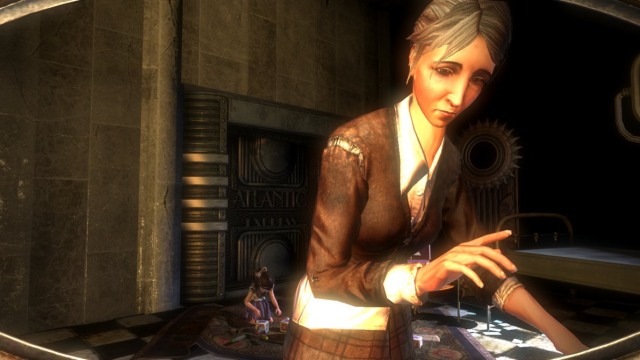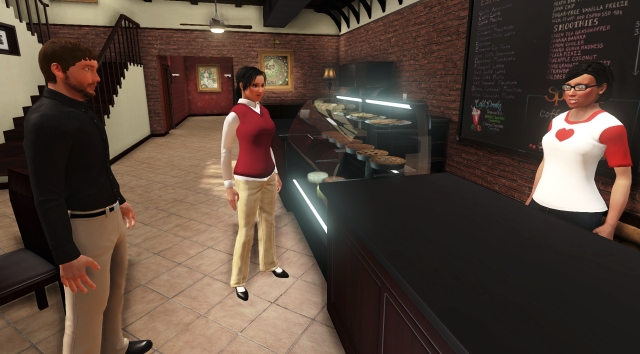
Video Games & Autism - Breaking Down The Stigma
Autism is the third most common developmental disorder in the world. Given that it’s almost commonplace in society now, it’s surprising that a majority of people still don’t really understand what it is. Just under 50 years ago, psychologist Bruno Bettelheim characterized autism as being caused by mothers not loving their children enough. People were pretty stupid back then and just went along with it. We obviously have a much greater understanding of the disorder now, but there is still a lot that people don’t know, or simply fail to understand.
The general attitude towards gaming and mental health is often a negative one, with news outlets and government research bodies claiming that games increase aggression amongst the young population, whilst also desensitising them to violence and a bunch of other nouns. Something that hasn’t been discussed often is the positive effects of gaming. It’s been well known since studies performed in the ‘80s that gaming improves cognitive ability and increases mental stimulation. The study by Cindy Stern BHSc and Zachary Munn shows that there is a possible link between cognitive leisurely activities and a decreased chance of dementia in the elderly. Cognitive leisurely activities could obviously be anything, but let’s face it, yir granda loves plowing people down in GTA.
Yer da jokes aside, it’s not just the elderly that can have an improved quality of life through gaming. People living with ASD (Autism Spectrum Disorder) can make leaps and bounds in certain aspects of their lives, including two of the most important- social and academic. It’s well known and documented that those on the autistic spectrum struggle with social situations, something that many of us pay no heed to. Simple actions like reading facial expressions and understanding emotions are a difficult, and often an arduous experience. This is not to say that all autistic people suffer through this, as it can often vary in severity and take up completely different symptoms.

There was a lot of discussion during the ‘80s around the possibility of computers replacing psychiatrists. Lawrence(1986) discusses the benefits of technology in the psychology profession, but states that they lack the programming to understand the nature of language. So until computers could accurately imitate human speech, they weren’t going to be helping anyone. Back when Lawrence theorized this, the concept of easy online communication was probably inconceivable. Modern technology allows us to stay in contact at all times, and has made finding new friends a lot easier. It has completely transformed modern gaming, which has multiple thriving communities for people to join.
Online gaming is absolutely brilliant for those diagnosed with ASD, especially Massively Multiplayer Online Games - It breaks down so many of the barriers to conventional socialising. Instead of a situation where a person has to carefully read the people around them, they are instead surrounded by avatars that have an element of emotive simplicity. There are rules, players can only use a set amount of expressions and emotes in games, with others having none at all. Optional voice chat is also excellent as it helps players move at their own speed towards socializing. Some players might not speak a word while initially starting a game, or joining a clan; but over time people might find themselves becoming comfortable and understanding communication much clearer.
Although, traditional videogames can also do their part to help those with ASD. There are many games with clearly defined narrative and communication. Bioware are an excellent example of this. Every Bioware game is centered around building relationships, something some ASD sufferers have trouble with. The communication is fairly limited with the choices being very clear and outcomes are explained to players visually. It’s obviously not as complex as real life communication, but it is definitely a great starting point.

What I find the most endearing is the inclusion of characters with ASD in several of my favourite videogames. Bioshock features Dr. Brigid Tenenbaum, diagnosed with high functioning autism at an early age, she then went on to become a scientific genius, discovering ADAM. Patricia Tannis, a character tied very closely to the plot in Borderlands 2 suffers from ASD, but she is also an expert on both the Vault and Eridians. Both of these characters show young people living with ASD,and that they can have achieve whatever they wish in life.
Rather than me just ramble about stuff I researched on the internet, I thought it best I asked a friend how gaming has helped them deal with their autism.
“When it came to socialising, I was very quiet and kept to myself, not really knowing how to talk to people. Playing with online communities, especially ones such as Minecraft and Garry's Mod, helped me to develop my socialising skills, as I could watch other people without being expected to contribute, and from there I adapted. One of my first proper friends was through Garry's Mod about 8 years ago, and I still talk to her to this day. Gaming has also always been an escape; a way to immerse totally into another world without worrying about my own worries or issues.”
There are so many studies and discussions around the positive and negative impacts that gaming can have, but we rarely hear from those suffering. Gaming is quite clearly a force of positive change for many people, potentially changing some people’s lives exponentially. I couldn’t help but notice how my friend mentioned Minecraft, a game synonymous with the autistic community. We’ve all watched those Minecon videos showing a lot of young kids, sometimes not realizing the awkwardness of their questions or statements. But without Minecraft and Minecon a lot of the children there, especially those on the autistic spectrum, would likely not have attended.

This is not to say that gaming is always a positive influence on those who suffer with neurodevelopmental disorders. Videogame addiction is something that many people suffer with, often without realizing they are. Children on the autistic spectrum are especially prone to it, a study in 2013 conducted by Mazurek and and Wenstrup showed that children living with autism spent 63% more of their time with interactive media compared to siblings who do not suffer with the disorder.
I think it’s quite easy to see why ASD sufferers might struggle with putting the controller down though. Gaming is a double-edged sword (even though all swords are double edged, aren’t they?). The aspects of gaming that form as coping mechanisms can often become too much of a crutch, which can lead to escapism. Some people might prefer the simplicity of the communication in gaming, so much so that they would rather settle for it than learn the real world equivalent. This is potentially dangerous as it might hinder a person’s progression into adulthood, and therefore miss out on essential life skills. I think it’s important for parents to find the right balance for their child, setting clear boundaries and a strict guideline for play time. It’s another case of each person being different, and with ASD often varying greatly between sufferers, it can affect some people far more than others.
There are developers now creating experiences specifically designed for people living with autism. The University of Texas have been working on a set of virtual environments in which adults with autism can enter using a VR headset. The different scenarios range from a dinner date, to meeting a new neighbour. There is also a councillor involved in proceedings giving the participant advice and guidance. As I mentioned earlier, researchers in the ‘80s didn’t believe that therapists would ever be replaced by technology; and while that still isn’t strictly true, technology could be playing a much larger role in the counselling of ASD. But we definitely won’t be seeing any psychiatrists moaning about how technology “took their jerbs” anytime soon.

The world of gaming sure is an interesting place to autism sufferers; it can provide a blanket of safety for people, but can easily smother them if relied on too heavily. We’ve made brilliant advances in the past few years, recognizing the specific and also vague needs that people require for a disorder that is varied and unique to each individual. I still think the biggest issue facing the autistic community is the lack of understanding on behalf of the rest us. Hopefully my glimpse into the world of autism and gaming gave you some insight and maybe the incentive to do some further research.








COMMENTS
Jeff-E - 05:30pm, 23rd May 2016
Are you on the spectrum yourself? (wasn't sure from the language).
Thomas.Hughes - 05:36pm, 23rd May 2016 Author
I'm not, I spent a lot of time researching the subject and talking to people who both suffer with it or look after someone that does.
Jeff-E - 05:39pm, 24th May 2016
Very cool! I research the experiences of young adults on the spectrum and write about gaming on another site, so it's awesome to see both brought together! ^.^
djd4ws0n - 11:31pm, 23rd May 2016
Great read. It's nice to see (for once) how games can help in different situations. Sure, as you mentioned it can also be a hinderance if not monitored, but I imagine anything that helps is welcomed - especially the work of Uni. Texas.
Mister Woot - 02:19pm, 26th May 2016
My step-son is on the spectrum and MMOs in particular have helped him engage with people in a way he would not have been able to do otherwise. He now is able to cope with "people" enough that he is at Comicon this weekend with his other half. Something that as recently as a year ago would have been unthinkable!
Thomas.Hughes - 02:54pm, 26th May 2016 Author
That's brilliant, I'm glad your step-son feels confident enough to go to comicon!
Lorrigan - 12:06pm, 27th May 2016
Brilliant article. Very interesting to look at MMOs as a social stepping-stone, something I've never considered before.
GarySheppard - 02:38pm, 28th May 2016
This is a really fascinating read. It's great to read about the positive side of gaming for a change.
Tammy - 06:28am, 15th June 2016
Great article. My son is Autistic and his only comment was to remove so many references to suffering.
Thomas.Hughes - 07:13pm, 16th June 2016 Author
I wasn't intending to upset anyone with that, I just wanted to emphasis the struggle that some people do have with autism. It's obviously different for every single person though.
Thanks for commenting, I'm glad you enjoyed the article and could relate to it!
SLS - 04:13am, 6th November 2016
I'm autistic...it's a different neurological wiring, not a disease. Struggle and challenge does not equate suffering. I have a physical issue that does cause suffering and it doesn't have inherent physical/mental positives...however the wiring in autism involves strengths and deficits. Autism is a state of being and shapes who I am...I'd be fundamentally different without it.
CraftyAK - 07:38pm, 16th June 2016
I think this is a great read well done